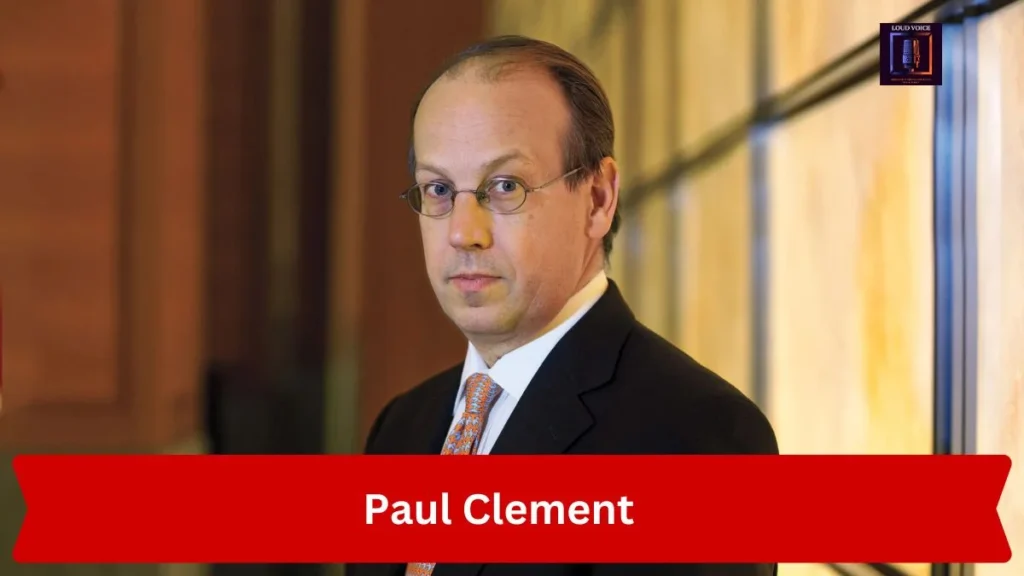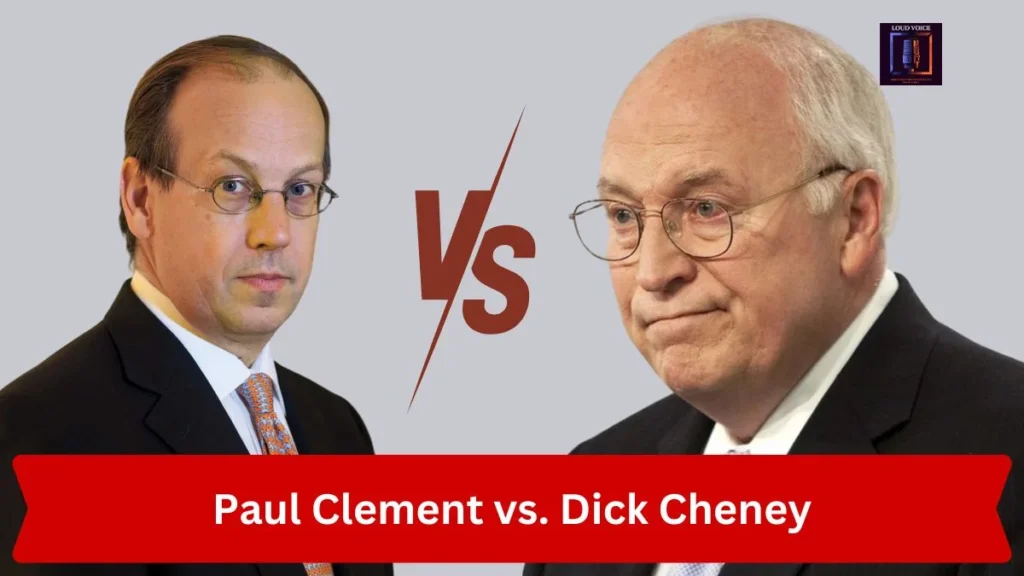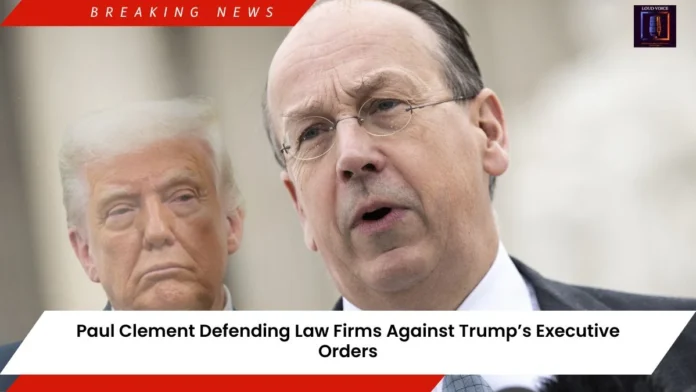Key Takeaways
- Paul Clement Defending Law Firms against Trump’s executive orders showcases his unwavering commitment to the rule of law, defending law firms like WilmerHale from politically motivated attacks.
- Clement, a conservative legal titan, leverages his Supreme Court expertise to challenge unconstitutional orders targeting law firms for their political affiliations.
- The executive orders aim to punish firms like WilmerHale and Perkins Coie, threatening their survival and intimidating the legal profession.
- Clement’s career reflects a principled defense of controversial causes, from gun rights to religious liberty, making him a pivotal figure in this legal battle.
- This case highlights broader tensions in the legal industry, where ideological conformity can clash with the duty to represent unpopular clients.
Paul Clement Defending Law Firms: Introduction
Imagine a courtroom packed with spectators, the air thick with anticipation, as one of America’s most formidable lawyers steps up to challenge a presidential executive order. This isn’t a scene from a legal thriller—it’s the real-life drama unfolding as Paul Clement, a conservative legal giant, defends Washington law firm WilmerHale against President Donald Trump’s aggressive tactics. Trump’s executive orders, targeting firms for their perceived political leanings, have sent shockwaves through the legal community, threatening the very foundation of the adversary system. Why does this matter? Because at stake is not just one firm’s survival, but the independence of the legal profession itself.
Clement’s involvement is no accident. Known for arguing landmark cases before the Supreme Court, from gun rights to religious liberty, he’s the lawyer you call when the stakes are sky-high. His decision to represent WilmerHale—a firm with deep Democratic ties—sends a powerful message: this isn’t about politics; it’s about principle. In this article, we’ll dive into Clement’s stand, explore the implications of Trump’s orders, and uncover why this legal battle could reshape the future of law in America.
The Executive Orders: A Direct Attack on Legal Independence
What Are Trump’s Executive Orders Targeting Law Firms?
In early 2025, President Trump issued a series of executive orders aimed at law firms he viewed as adversaries. In the first, lawyers employed by former special counsel Jack Smith had their security clearances withdrawn in protest of Covington & Burling. The second, targeting Perkins Coie, barred its lawyers from government buildings and jeopardized the contracts of its clients. The third, issued on March 27, 2025, hit WilmerHale, a firm with ties to the Kamala Harris campaign and the Democratic National Committee. These orders weren’t subtle—they were designed to punish firms for their legal work and intimidate others from challenging the administration.
The impact was immediate. WilmerHale, known for its pro-bono work on liberal causes and for employing attorneys like former special counsel Robert Mueller, faced an existential threat. As U.S. District Judge Richard Leon, a George W. Bush appointee, noted during a hearing, the firm’s “very survival is at stake.” The orders signal a chilling message to the legal profession: cross the administration, and pay the price.
Why WilmerHale? The Political Context

WilmerHale’s prominence made it a prime target. Its representation of Democratic causes, combined with its history of challenging Trump-era policies, put it in the crosshairs. But this isn’t just about one firm. The orders reflect a broader strategy to control the legal landscape, discouraging firms from taking on cases that might oppose the administration’s agenda. As Clement argued in court, “The signal this sends to the whole bar is, ‘Watch out. We’re watching.’”
Paul Clement’s Stand: A Conservative Champion for the Rule of Law
Who Is Paul Clement?
Paul Clement is no ordinary lawyer. At 58, he’s argued 119 cases before the Supreme Court, a feat unmatched by most. A Harvard Law graduate, he clerked for conservative icons like Judge Laurence Silberman and Justice Antonin Scalia. His career includes stints as chief counsel to Senator John Ashcroft and Solicitor General under George W. Bush, making him the youngest to hold that role in over 50 years. Clement’s conservative credentials are impeccable—he was on Trump’s shortlist for a Supreme Court vacancy—yet his principles transcend party lines.
Clement’s track record is a masterclass in legal advocacy. He has battled for religious freedom (Hobby Lobby), gun rights (New York State Rifle & Pistol Association v. Bruen), and the repeal of the Chevron doctrine, a long-standing regulation that given preference to government organizations. But he’s also taken on cases that defy ideological labels, like defending the House of Representatives in the Defense of Marriage Act case, even when it cost him partnerships at major firms.

Why Clement Took the Case
Clement was the one WilmerHale turned to when it needed a defender. Seth Waxman, a former Solicitor General and WilmerHale partner, reached out, knowing Clement’s reputation for tackling tough cases. Despite running a small firm of just 15 lawyers, Clement didn’t hesitate. On March 28, 2025, he filed a lawsuit challenging Trump’s executive order, and within hours, Judge Leon blocked most of its effects. Clement’s argument was clear: these orders violate the rule of law and undermine the adversary system that defines American justice.
Clement’s decision wasn’t driven by politics. As Waxman told me, “Paul’s undertaking this representation reflects that there is no daylight across the ideological spectrum about how utterly unconstitutional these orders are.” For Clement, it’s about principle—lawyers must be free to represent clients without fear of retribution.
The Legal Battle: A Test for the Judiciary
The Courtroom Showdown
The legal fight is unfolding in Washington’s federal courts. Judge Leon, who initially blocked Trump’s order, heard arguments on WilmerHale’s request for a permanent injunction. Across the hall, Judge Beryl Howell considered a similar challenge from Perkins Coie. Both judges, known for their independence, seemed receptive to the firms’ arguments. Leon, in particular, appeared troubled by the orders’ implications, nodding as Clement warned of a legal profession under siege.
The case is almost certain to reach the Supreme Court, where Clement’s familiarity with the justices could prove crucial. His conversational style—described by peers as “assurance without cockiness”—has won him respect among the justices, even those who disagree with his positions. As Lisa Blatt, a fellow Supreme Court advocate, put it, “He can talk on the justices’ level in a way I’ve never seen.”
Broader Implications for the Legal Profession
This is a war for the essence of the legal profession, not just for WilmerHale. Trump’s orders threaten to create a chilling effect, discouraging firms from taking on controversial cases. Large firms, reliant on government contracts, are particularly vulnerable. Clement’s own firm, with its boutique model, is less exposed, but his stand underscores a critical point: lawyers must defend unpopular causes, no matter the cost.
The case also highlights tensions within the legal industry. Major firms, under pressure from corporate clients, often shy away from controversial representations. Clement himself faced this at King & Spalding and Kirkland & Ellis, resigning when the firms dropped his clients over ideological concerns. As Harvard Law professor Jack Goldsmith noted, Clement is now defending the very firms that once pushed him out—a testament to his commitment to principle over personal grievance.
Clement’s Career: A Legacy of Principle Over Politics
A Conservative Firebrand with a Nuanced Approach
Clement’s career is a study in principled advocacy. He’s taken on polarizing causes—gun rights, religious liberty, healthcare reform—yet avoids maximalist positions that could backfire. For instance, he avoided using controversial language when arguing for a uniform federal standard in the Defense of Marriage Act case. As Roberta Kaplan, his opposing counsel, recalled, “He was the only one who didn’t denigrate gay people.”
His approach has earned him respect across the ideological spectrum. Former Solicitor General Donald Verrilli, who faced Clement in the Affordable Care Act case, called him “a genuinely principled person” willing to take professional risks for his beliefs. Even Justice Elena Kagan, a liberal icon, praised Clement’s integrity when he resigned from King & Spalding over the DOMA controversy.
Facing Down Power: Clement vs. Cheney

Clement’s independence isn’t new. As Solicitor General, he clashed with Vice President Dick Cheney over a Second Amendment case. When gun rights advocates pushed for a maximalist ruling, Clement urged a balanced approach, prioritizing the broader interests of the federal government. Despite pressure from Cheney and conservative commentators, he held firm, earning praise for his integrity.
This episode mirrors his current stand. By taking on Trump’s administration, Clement is once again prioritizing principle over political loyalty, a stance that sets him apart in an era of partisan divides.
The Bigger Picture: Ideological Tensions in Big Law
The Pressure to Conform
Clement’s experiences at King & Spalding and Kirkland & Ellis reveal a troubling trend in Big Law: ideological conformity. When he defended DOMA, pressure from clients like Coca-Cola and groups like the Human Rights Campaign forced his resignation. When he represented gun rights clients, Kirkland & Ellis gave him an ultimatum. These incidents reflect a broader challenge—law firms, driven by corporate interests, are increasingly reluctant to take on controversial causes.
Mike Davis, a Trump adviser, put it bluntly: “The same law firms that chased Paul Clement out of town are now begging for him to rescue them.” While Davis’s tone is provocative, the irony is real. Clement’s stand is a reminder that lawyers must resist external pressures, whether from clients, activists, or presidents.
A Call to Action for the Legal Profession
Clement’s actions challenge the legal community to rethink its priorities. Firms must balance profitability with their duty to uphold the rule of law. By defending WilmerHale, Clement is modeling what it means to put principle first, even when it’s unpopular. His example could inspire a new generation of lawyers to take on tough cases, regardless of the political climate.
Conclusion: A Legacy of Courage
Paul Clement’s stand against Trump’s executive orders is more than a legal battle—it’s a defining moment for the rule of law. By defending WilmerHale, he’s reminding us that the legal profession’s independence is non-negotiable. His career, marked by principled advocacy and fearless representation, offers a blueprint for navigating turbulent times. As the case heads to the Supreme Court, one thing is clear: Clement’s legacy will be defined not by the cases he won, but by the courage he showed when it mattered most.


